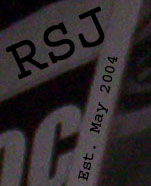|
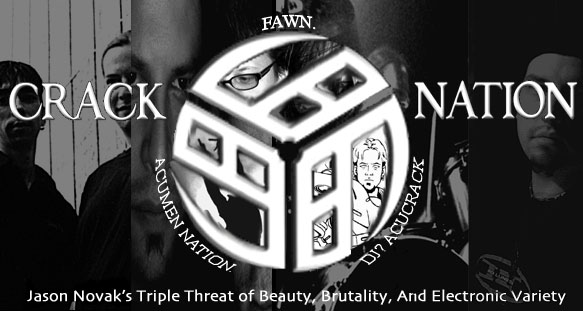
If you think you know what Jason Novak is about from the industrial intensity that is Acumen Nation -- you're wrong. You're
similarly misinformed if you think you have it figured out from DJ? Acucrack's electronic assault. And if you've stumbled
upon Fawn's shoe-gazing beauty, you still only have a third of the picture. Put all sides together, however, and you begin
to get some idea of Novak's multi-faced musicality. With both recent and upcoming releases from all three projects under
the Cracknation banner, Novak has a full schedule for this fall. Rock Star Journalism catches up with him before he takes
the show on the road this October.
Rock Star Journalism: There's so much to ask you about right now, but let's start with Acucrack. Each release has explored
a slightly different area of electronica -- Mako vs. Geist was very much a drum-n-bass album. How would you describe Killing
Mobius?
Jason Novak: I think it's more in the vein of what we set out to do with Acucrack, which was to mix different electronic
styles together. The idea behind the project in the first place was our disgust with the different genre names that had been
cropping up and standardizing electronica in these little pigeonholes. We wanted to try and mix it up a little bit, but along
the way I got really caught up with drum-n-bass. And then after Mako, we sort of exhausted it, and I felt the need to go
back and mix it up a little more. So, this album is a little more experimental.
RSJ: I thought the song "Send More Paramedics" was very interesting, as well as very different from your previous
work. What was the inspiration behind the spoken word piece?
JN: That was Jamie Duffy's big contribution to the record -- the music for that piece. I wasn't sure what to do with it
and then this idea just evolved out of it. It's basically two people who are trapped underneath a car, and they're in a lethal
accident and their brains are starting to go as they're waiting for help to arrive. And they're having this disconnected
conversation as they drift off into death. I have no idea where it came from; I was just trying to do something different
with the piece.
RSJ: We'd talked before about your feelings that Acucrack doesn't get any recognition in the electronic world. Do you
think that's changed at all?
JN: No. I used to be kinda bummed about it, but I don't really care anymore. I sort of felt like I was standing on the
outside of a cool party that I didn't have the right clothes to get into. And then I bought the right clothes, got to the
party -- and it sucked. So, I think we're just going to do what we like to do and enjoy it no matter who gets off on it.
RSJ: When you opened for established drum-n-bass acts like Dieselboy, what kind of reaction did you get?
JN: It was great. That's one of the confusing things -- we've opened for almost half a dozen huge jungle DJs and the
response has been tremendous, but then it didn't really do anything for us. I thought maybe it would increase our visibility
within the jungle community and things would really explode, but it's a hard nut to crack.
RSJ: For some of the upcoming Acumen shows, you're going to have a DJ set afterward. What are you going to be spinning?
JN: I'll probably bring a laptop and vinyl scratch and do a set of Crack-related material, remixes and stuff people haven't
heard yet. Just try to keep it a little more varied, as opposed to a straight jungle set. And then on this KMFDM tour, in
a few cities we have full Acucrack performances booked for after shows at different clubs.
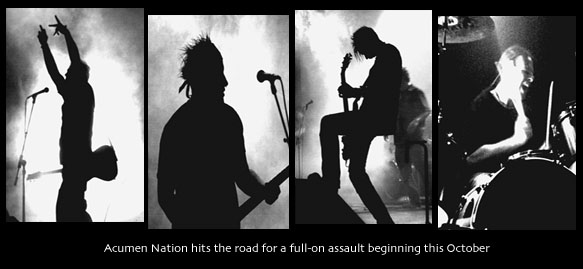 RSJ: Moving on to Anticore, the upcoming Acumen album, this seems like it will be the hardest Acumen Nation release yet.
JN: Yeah, in fact we're even cutting a few songs that lean toward an older style that just don't fit the bill. We're
definitely proud to be getting older and angrier, as opposed to most bands that kinda mellow with age. I think we're all
just excited that it's not happening for us that way.
RSJ: What made you want to go in this direction?
JN: The kind of music that we've been listening to. I mean, we don't listen to industrial rock -- I don't even know how
much is really left anymore. We started listening to a lot more hardcore, a lot more Meshuggah and Dillinger Escape Plan
style metal. It just really affected us, and this is what we've always wanted to do, but we loved having these loops and
backing tracks in our music. So we were like, what if we just try to bend the backing tracks more in this chaotic direction?
And now we have all the elements of the old Acumen -- growling vocals, really heavy guitars, and lots of samples and beats
-- but it's not necessarily dancefloor material. It's more aggressive but still has our signature sound.
RSJ: Do you feel like this is something of a reaction against the synth/EBM trend in industrial music?
JN: Definitely. We came from the coldwave side of things -- the Chemlabs and the 16 Volts -- and then it just seemed
like it splintered off and what grew out of it was what I would consider strictly techno -- the VNV Nations and all this dance
music. If you go to a trance party, it's almost the same thing, except they've got glow sticks instead of black lipstick.
To me, the music's almost interchangeable now. I think everybody just bailed on the aggressive guitar side of things. It's
almost like the industrial community threw in the towel and said, "alright trance -- we like you, we'll just go with
you and not try to make something different."
RSJ: Listening to the new songs, it sounds like there's more pure screaming. Was it difficult to adjust your vocal style
to that?
JN: No, not at all. Another thing that's been getting to us over the past few years is that a lot of people say our shows
are a lot more aggressive and they enjoy that aspect, as opposed to the albums that have more singing and the production's
a little bit safer. We started to feel more of a kinship with how we did things live than what was on the albums. I think
we've been disappointed in almost every single one of our albums because it doesn't come across the way we'd like it to.
So, I think with this new album we tried to make it so there's not a difference to anyone who listens to it or sees us live.
It feels the same way; the same levels of aggression are reached.
RSJ: You've described Anticore as a concept album attacking hypocrisy. Could you explain this in a little more detail?
JN: We're all just disgusted with every aspect of government, religion and pop culture. I was really impressed last year
with a lot of the artists that tried to convince the idiots of this country not to vote for Bush. It's so exciting that there's
bands putting their money where their mouth is because the music business as a whole is so boring. It's so milquetoast --
these bands play the same music, they look so pretty and it just doesn't feel real. So, I thought if we felt this way and
we were this upset with everything, why not make the album a part of that voice?
RSJ: It seems like this album is more focused on reactions to issues in society, whereas the past few have been lyrically
very personal to you.
JN: Yeah, definitely. I don't have the need to get that out of my system now and work out my personal life in the music.
I'd rather concentrate on saying what other people aren't saying. I think music is such a big part of the counterculture
and making sure that people know that there is a voice out there, that people are disappointed. But you just don't see that
anymore. The youth are the most disaffected of all. I think that's what Anticore is all about. There is no other "core."
All the emocore and hardcore -- well this is just anticore. Fuck all of it. It's all bullshit.
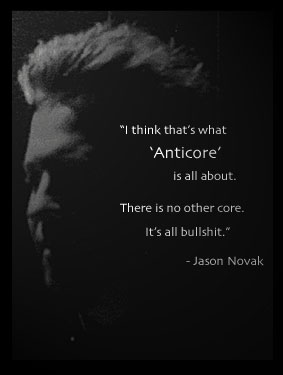 RSJ: Along with the new album, there's also going to be another release from Acumen. What can you tell me about this?
JN: It's called What the Fuck, and it's ten years of crazy stuff nobody's heard, all the way back to the first "Gun
Lover" demo. Plus remixes of "Fuck Yer Brains Out" and "Bleed For You," and then there's a couple
songs that aren't gonna make the new album, so we're gonna put them out on this. That comes out in October.
RSJ: You mentioned this briefly before, but the Fawn project is something you've been working on for four years. I know
you were interested in putting this out on a different label -- why did you finally decide to just release it yourself?
JN: We don't have the right machine in place to shop it around to labels, and I'm exhausted from ten years in the industry
of getting the door shut in my face. I just wasn't ready to take this thing that I love so much and get rejected everywhere
because that's what I'm used to. It felt like this music needed to come out, and I'm not ready to put out a full-length album
with no money to promote it and no way to tour. So we decided on this EP with a limited release so the few hundred fans across
the country that have been waiting and downloading the MP3s could at least get something.
RSJ: Fawn is a completely different style from your other bands. What would you say you get out of this project that
you don't get from the others?
JN: Just the pure bliss. The ability to slow down. With the Acumen stuff, we play everything so fast, and it's fun,
but you miss so much of the resonance and the beautiful stuff that can come out of playing. I think one of the biggest goals
with Fawn is to express these desires musically and lyrically.
How many bands make this mistake -- they have an aggressive nature and then they put out a record that has this bullshit
in it that doesn't belong because the singer just got a divorce. It's like, fuck you, this is not what we want to hear.
People forget that the fan is not a fan of you, they're a fan of your music. And sometimes I think it's a little selfish
to just inject "I want to do an acoustic love song" on a death metal record. In the past with Acumen, especially
the More Human Heart record, there were a few ballad-type things on there, and I sort of felt like this isn't right, we can't
ever do this again. So, doing Fawn allows me to get those emotions out in a place that keeps Acumen's angry energy pure.
RSJ: You mentioned once that you felt there is a void to be filled in the shoe-gazer genre. It's interesting that you
say that, considering there are a lot of Interpol-type bands out right now that people put in that genre.
JN: I think those bands miss the mark because they channel a little too much of a European 80s sound that isn't necessarily
shoe-gazer. To me it just sounds way too commercial. Whether it's The Killers or Interpol or Franz Ferdinand -- those three
bands, people want to put them in this category of mopey early 90s music, but there's too much pop and there's too much energy
for me to believe they're a part of that.
RSJ: How did you get involved with the other members of Fawn?
JN: Right now the drummer is Dan Brill, the Acumen drummer. And then I had been friends with Justin, who had a band called
Atombombpocketknife, and he and I always wanted to work together. Andrew used to play bass for a band called Starstruck --
they were kind of an emo punk band -- but he's always loved the Fawn demos, so when it came time to find somebody to play,
he was perfect for it. So, right now we're all dressed up with no place to go. We've got this EP, and we've got these songs,
but we just don't have the time to really commit to playing out.
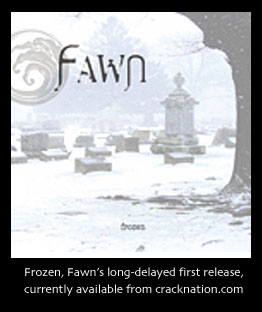 RSJ: You've certainly got a lot going on with your own projects, but you also do a lot of production and remix work for other
bands. Jared Louche had recently mentioned that you might be doing something for the Oxidizer remix album. This was surprising
considering the history there.
JN: All the bad feelings have definitely dissipated and I wish him and Chemlab the best and I'm sure it's vice versa.
But I remember when [the remix project] was brought up, and I just personally didn't want reopen any of those tunes and work
on them again. Given the history, that seemed kind of stupid. Any kind of negative aspect I think is totally gone, however,
I just don't think I'm gonna work on the record more.
RSJ: I know you also did some work on the Cyanotic album. Are you happy with how that came out?
JN: Yeah. That to me is a piece of history that's been made in the present. They've got some really good ideas and cool
production values. We wouldn't just take on any industrial band and produce their record, but when we heard them we thought,
wow, this is good. We should help these guys out and just make everything more punchy. We had a good time mixing and producing
it with Sean [Payne], and I'm proud of it and I think they should be too. I think in the world of the Metropolis bands and
EBM, that's a real cool record that harkens back to the past, but still has a lot of new ideas.
RSJ: What would your advice be for someone like that, a band that's starting out in the industrial scene now?
JN: You've got to try to make things happen for yourself. If you're interested in this kind of music, you should know
that it is a dead art form as far as the world of major label music is concerned. Even the most successful of these bands
are still only going to sell four or five thousand copies. You're never going to get rich making industrial music. You might
feed your soul and make a few people very happy, and all the more power to you, but you've got to accept where the style of
music is in our culture. There's not a huge audience for it, so, you need to earn the listeners that are out there. Make
a record and get it out there. You can produce it at home, you don't need a record deal. Just spread it out as best you
can and get people to start talking about you.
RSJ: Looking at the new Cracknation site, you have links to other services you offer, such as website design. Do you
envision Cracknation becoming a multimedia type organization?
JN: That's what it always has been, I just never really shared the other parts. We have a bunch of clients that we do
music pieces for, and we have a couple companies that we create specific commercial pieces for that get licensed for film
trailers. Then we have a flash design side of things. And then we have the record label, which is where most of the people
that know Cracknation are from. There's sort of these three separate entities and we figured maybe it was time to share what
all of them are with the other aspects and maybe connections could grow out of it.
RSJ: If you were forced to choose among your many projects, which would you say you feel the closest to?
JN: Acumen. In the back of my mind, no matter what I've done musically, I always think, I hope one of these flies so
I can get Acumen Nation the attention that I think it deserves. And there were so many times on that KMFDM tour with Acucrack
where Jamie and I would look at each other and think how we would be killing if we were up there with Acumen. And then, sure
enough, it would get confirmed after the show when fans would show up with Transmissions records asking when Acumen was coming.
And it just made us smile -- like, see, this is what started it all.
Got something to say about this feature? E-mail us.

|
